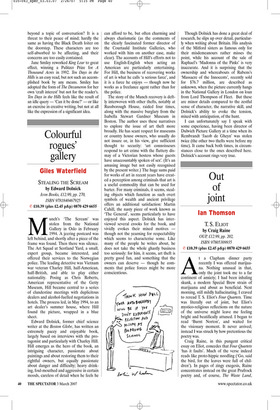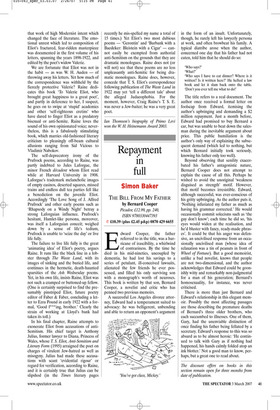Out of joint
Ian Thomson
T. S. ELIOT by Craig Raine OUP, £12.99, pp. 202, ISBN 97805309935 ✆ £10.39 (plus £2.45 p&p) 0870 429 6655 At a Clapham dinner party recently I was offered marijuana. Nothing unusual in that, only the joint took me to a far continent of anxiety; I had been inhaling skunk, a modern Special Brew strain of marijuana and about as beneficial. Next morning, still mildly hallucinating, I craved to reread T. S. Eliot’s Four Quartets. Time was literally out of joint, but Eliot’s mystico-religious reflections on the nature of the universe might leave me feeling bright and beatifically attuned. I began to read ‘Burnt Norton’, and waited for the visionary moment. It never arrived; instead I was struck by how pretentious the poetry was.
Craig Raine, in this pungent critical essay on Eliot, concedes that Four Quartets ‘has it faults’. Much of the verse indeed reads like proto-hippie noodling (‘Go, said the bird, for the leaves were full of children’). In pages of zingy exegesis, Raine concentrates instead on the great Prufrock poetry and, of course, The Waste Land, that work of high Modernist intent which changed the face of literature. The emotional unrest which led to composition of Eliot’s fractured, fear-ridden masterpiece was documented in the first volume of his letters, spanning the years 1898-1922, and edited by the poet’s widow Valerie.
We are fortunate that Eliot was not in the habit — as was W. H. Auden — of throwing away his letters. Yet how much of the correspondence was withheld by the fiercely protective Valerie? Raine dedicates this book ‘To Valerie Eliot, who brought great happiness to a great poet’, and partly in deference to her, I suspect, he goes on to swipe at ‘stupid’ academics and other ‘self-righteous cretins’ who have dared to finger Eliot as a predatory bisexual or anti-Semite. Raine loves the sound of his own opinionated voice; nevertheless, this is a fabulously stimulating book, which marries old-fashioned literary criticism to pleasingly off-beam cultural allusions ranging from Sid Vicious to Vladimir Nabokov.
The self-deprecatory irony of the Prufrock poems, according to Raine, was partly indebted to Jules Laforgue, the minor French décadent whom Eliot read while at Harvard University in 1908. Laforgue’s trademark melancholic images of empty casinos, deserted squares, missed trains and endless dull tea parties fell like a benediction on the juvenile Eliot. Accordingly ‘The Love Song of J. Alfred Prufrock’ and other early poems such as ‘Rhapsody on a Windy Night’ betray a strong Laforguian influence. Prufrock’s hesitant, Hamlet-like persona, moreover, was itself a Laforguian conceit; weighed down by a sense of life’s tedium, Prufrock is unable to ‘seize the day’ or live life fully.
The failure to live life fully is the great ‘animating idea’ of Eliot’s poetry, argues Raine. It runs like the black line in a lobster through The Waste Land, with its images of sinking and the buried life, and continues in the hermetic, death-haunted sparsities of the Ash Wednesday poems. Yet, in his own life, insists Raine, Eliot was not such a cramped or buttoned-up fellow. (One is certainly surprised to find the presumably pinstriped Eliot, future poetry editor of Faber & Faber, concluding a letter to Ezra Pound in early 1922 with a formal, ‘Good f***ing, brother.’ Clearly the strain of working at Lloyd’s bank had taken its toll.) In his final chapter, Raine attempts to exonerate Eliot from accusations of antiSemitism. His chief target is Anthony Julius, former lawyer to Diana, Princess of Wales, whose T. S. Eliot, Anti-Semitism and Literary Form (1995) arraigned the poet on charges of virulent Jew-hatred as well as misogyny. Julius had made these accusations with scant ‘evidential rigour’ or regard for verification, according to Raine, and it is certainly true that Julius can be slipshod (in the Times literary pages recently he mis-spelled my name a total of 15 times.) Yet Eliot’s two most dubious poems — ‘Gerontin’ and ‘Burbank with a Baedeker: Bleistein with a Cigar’ — cannot easily be exempted from authorial anti-Semitism on the grounds that they are dramatic monologues. Raine does not (or will not) see that these poems are no less unpleasantly anti-Semitic for being dramatic monologues. Raine does, however, concede that T. S. Eliot’s correspondence following publication of The Waste Land in 1922 may yet ‘tell a different tale’ about the alleged Judaeophobia. For the moment, however, Craig Raine’s T. S. E. was never a Jew-baiter; he was a very great poet.
Ian Thomson’s biography of Primo Levi won the W. H. Heinemann Award 2003.











































































 Previous page
Previous page